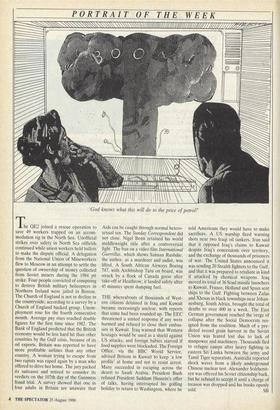PORTRAIT OF THE WEEK
`God knows what this will do to the price of petrol!'
The QE2 joined a rescue operation to save 49 workers trapped on an accom- modation rig in the North Sea. Unofficial strikes over safety in North Sea oilfields continued while union workers held ballots to make the dispute official. A delegation from the National Union of Mineworkers flew to Moscow in an attempt to settle the question of ownership of money collected from Soviet miners during the 1984 pit strike. Four people convicted of conspiring to destroy British military helicopters in Northern Ireland were jailed in Boston. The Church of England is not in decline in the countryside, according to a survey by a Church of England backed group. Unem- ployment rose for the fourth consecutive month. Average pay rises reached double figures for the first time since 1982. The Bank of England predicted that the British economy would be less hard hit than other countries by the Gulf crisis, because of its oil exports. Britain was reported to have more profitable airlines than any other country. A woman trying to escape from two rapists was raped again by a man who offered to drive her home. The jury packed its suitcases and retired to consider its verdicts on the 107th day of the Guinness fraud trial. A survey showed that one in four adults in Britain are unaware that
Aids can be caught through normal hetero- sexual sex. The Sunday Correspondent did not close. Nigel Benn retained his world middleweight title after a controversial fight. The ban on a video film International Guerrillas, which shows Salman Rushdie, the author, as a murderer and sadist, was lifted. A South African Airways Boeing 747, with Archbishop Tutu on board, was struck by a flock of Canada geese after take-off at Heathrow; it landed safely after 45 minutes spent dumping fuel.
THE whereabouts of thousands of West- ern citizens detained in Iraq and Kuwait became increasingly unclear, with reports that some had been rounded up. The EEC threatened a united response if any were harmed and refused to close their embas- sies in Kuwait. Iraq warned that Western hostages would be used as a shield against US attacks, and foreign babies starved if food supplies were blockaded. The Foreign Office, via the BBC World Service, advised Britons in Kuwait to keep 'a low profile' at home and not to resist arrest. Many succeeded in escaping across the desert to Saudi Arabia. President Bush refused President Saddam Hussein's offer of talks, having interrupted his golfing holiday to return to Washington, where he told Americans they would have to make sacrifices. A US warship fired warning shots near two Iraqi oil tankers. Iran said that it opposed Iraq's claims to Kuwait despite Iraq's concessions over territory, and the exchange of thousands of prisoners of war. The United States announced it was sending 20 Stealth fighters to the Gulf, and that it was prepared to retaliate in kind if attacked by chemical weapons. Iraq moved its total of 36 Scud missile launchers to Kuwait. France, Holland and Spain sent ships to the Gulf. Fighting between Zulus and Xhosas in black townships near Johan- nesburg, South Africa, brought the total of deaths to over 400 in a week. The East German government reached the verge of collapse after the Social Democrats res- igned from the coalition. Much of a pre- dicted record grain harvest in the Soviet Union was feared lost due to lack of manpower and machinery. Thousands fled to refugee camps after heavy fighting in eastern Sri Lanka between the army and Tamil Tiger separatists. Australia reported shock waves from a likely underground Chinese nuclear test. Alexander Solzhenit- syn was offered his Soviet citizenship back, but he refused to accept it until a charge of treason was dropped and his books openly










































 Previous page
Previous page